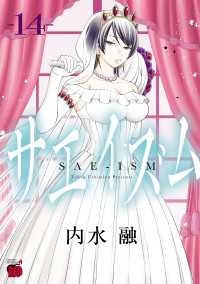- ホーム
- > 洋書
- > 英文書
- > Philosophy
Full Description
Politics as Radical Creation examines the meaning of democratic practice through the critical social theory of the Frankfurt School. It provides an understanding of democratic politics as a potentially performative good-in-itself, undertaken not just to the extent that it seeks to achieve a certain extrinsic goal, but also in that it functions as a medium for the expression of creative human impulses. Christopher Holman develops this potential model through a critical examination of the political philosophies of Herbert Marcuse and Hannah Arendt.
Holman argues that, while Arendt and Marcuse's respective theorizations each ultimately restrict the potential scope of creative human expression, their juxtaposition - which has not been previously explored - results in a more comprehensive theory of democratic existence, one that is uniquely able to affirm the creative capacities of the human being. Yielding important theoretical results that will interest scholars of each theorist and of theories of democracy more generally, Politics as Radical Creation provides a valuable means for rethinking the nature of contemporary democratic practice.
Contents
Introduction: Marcuse, Arendt, and the Idea of Politics
Chapter One: Marcuse's Critique and Reformulation of the Philosophical Concept of Essence
Culture and Bourgeois Freedom
Critical Theory and the Ethical Imperative: Happiness-Reason-Freedom
Hegel and the Dialectic of Negativity
Essence and the Dialectic of Labour
Chapter Two: The Dialectic of Instinctual Liberation: Essence and Non-Repressive Sublimation
The Problem of Repression: Individual and Social, Basic and Surplus
The Affirmation of Sensuousness: Primary Narcissism and Non-Repressive Sublimation
Non-Repressive Sublimation and Non-Alienated Labour
Chapter Three: The Problem of Politics
Marx's Political Ambiguity
The Limits of Western Marxism
Marcuse's Reproduction of the Marxian Anti-Politics
Administration as Domination and Liberation
Chapter Four: Hannah Arendt's Theory of Public Freedom
Performativity and Essence: The Need for Radical Creation
The Subject of Radical Creation: Politics and the We
Agonism, Democracy, and Political Objectification
Arendt and Revolutionary History
The Institutionalization of the Revolutionary Impulse: The Council Tradition
Chapter Five: Marcuse Contra Arendt: Dialectics, Destiny, Distinction
Questioning Distinction: the Vita Activa and Marx's Ontology of Labour
Arendt's Critique of the Dialectic: On the Need for Distinction
Marcuse's Critique of Non-Dialectical Dialectics
Chapter Six: Marcuse: Reconsidering the Political
The Theory of the Radical Act
The Affirmation of Socialist Nature
Politics and the New Left
Spontaneity and the Council Tradition
Conclusion: From the New Left to Global Justice and from the Councils to
Cochabamba
Works Cited








